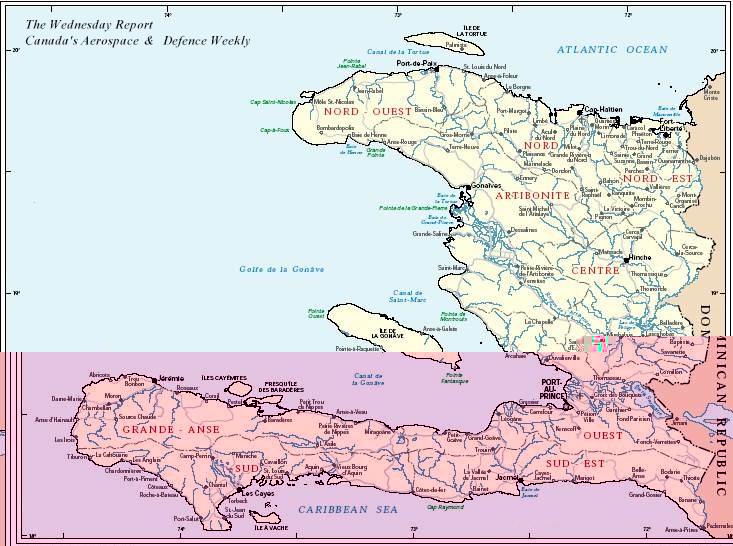
Volume 18, Number 10, March 3, 2004
 Send this document link to a colleague
Send this document link to a colleague Comment:
Do We Trash A Democratically Elected Government Perceived as Corrupt and Inept?
That headline could apply to a lot of places, couldn't it? In the Twenty-First Century, allegations of corruption in high places have reached a crescendo. This week, France, America and Canada --three notable newsworthies accused in various recent corruption allegations-- have a hand in ousting a democratically elected leader they didn't like because he was, "corrupt". It is appropriate to be at least a little cynical about this event.
Should Secretary-General Kofi Annan resign?
It appears that with the oversight of the U.N., Jean-Bertrand Aristide has been deposed by the United States, France and a U.S.-backed Haitian Opposition Party. It's messy all around and there are few clearer statements than that. Nevertheless, with Aristide gone and a U.S. puppet government in place under Mr. Andy Apaid, there is the potential for a clear path forward for Haiti that could lead to a better human condition for Haiti's seven million population, some 400,000 of whom are near starvation. That's the real issue here.
A good cop once told us that "a detective must be a bit of a con man to catch a con man". The lesson in that is that sometimes one needs to step on that vague line between morale right and wrong to effectively deal with scoundrels and beat them at their own game. Aristide's government indeed appears to have been comprised of scoundrels. Aristide, the former popular Catholic priest who started out ministering to Haitian slums may have become a scoundrel himself. He wouldn't be the first tarnished Catholic priest these days. Meanwhile the U.S. State Department most certainly wandered over the moral line the last few years in its dealings with Aristide, meddling with and bolstering Aristide's opponents.
The U.S. State Department had opposed Aristide's last reelection four years ago and according to many observers had put some weight behind the rebel forces which had deposed Aristide in 1991. Last week the United States Embassy in Port-au-Prince was telling Aristide that he must voluntarily resign or be killed. Just how voluntary was this resignation? Well, clearly it wasn't. Aristide says he didn't voluntarily resign. Washington says "Nonsense!".
Haiti has been a mess that no one could contend with. By hook or by crook something had to be done if the population of Haiti is to be rescued from chaos and starvation. Unfortunately the remedy chosen by the international community was to muscle out of office a democratically elected government. That is a huge tragedy and cause enough for Secretary-General Kofi Annan's resignation.
The United Nations has had thirteen years to fix the problem in Haiti. To let the situation get so bad that overturning a democratic election is the only way forward is manifestation of an abysmal failure of the U.N.
Many countries of the world contributed substantial resources to the United Nations' efforts in Haiti at the cost to their citizens. What has the U.N. accomplished with those resources? Ne rien.
On Monday, Kofi Annan said the Security Council's approval of a multinational force to be followed by a UN mission in Haiti is a signal that the world has not forgotten Haiti. He said after the Council's vote, "We understand their need and we are standing by them in their hour of need. And the international community will do whatever they can to help stabilize the situation."
Jamaica's Prime Minister P. J. Patterson who is now miffed had been negotiating for weeks trying to find a compromise among the opposed factions in Haiti. The goal was to reach some form of power sharing in which Artistide would resign and an interim process would rule until free elections could be held. Jamaica and The Bahamas are expected to make sizeable contributions to the U.N. stabilizing mission.
U.S.-backed, New York-born American citizen Andrew Apaid (52) was taking control of Haiti on Monday in the Haitian capital after Artistide was removed. Not as titular head of state, but the Opposition Leader pulling the strings, Apaid had refused to accept a form of power-sharing with Arisitide in the weeks before Aristide's removal from the country which came about on Sunday night.
Conflicting accounts about Aristide's departure range from outright resignation and plea to the U.S. for assistance, to a claim that Aristide was kidnapped from his home by combat-arms persons who took him away by force. The latter is what Aristide himself claims happened.
By all accounts, Aristide was under some considerable pressure from many nations to yield to armed rebels and leave Haiti. By Sunday, rebel forces under various disjointed commands, and in some areas under no command at all, controlled more than half the country which has been a state of complete anarchy for more than two weeks.
U.S. Congresswoman Maxine Waters --(D) California-- told media on Monday she had received a phone call at 6:00 am local time on 1 March from the Aristides who believed, she said, they were somewhere in Africa.
"Mildred Aristide was on the phone...", said Walters. The caller told the Congresswoman that "the coup d'etat is complete". Then Mr. (Jean-Bertrand) Aristide came on the phone and gave her an account of events that clearly set out that he was abducted from his house and his country by U.S. forces of some kind, aided by African and French officials.
"He told me," said Waters, that "[a representative of the U.S. Embassy] with U.S. Marines came to his house at night and told him to come along and flee the country or he and many supporters would be killed". Waters says she learned from Aristide that French and African officers were guarding he and his wife on Monday morning. He told Waters he felt like he was in Jail and he didn't know for certain where he was being held.
We suspect his dis-orientation was not so profound as to prevent him overstating his case. TWR has learned from sources that there was consternation aloft when the evacuation escorts aboard Aristide's contracted extraction aircraft, including Aristide's own security detail, were informed by secure VHF radio that South Africa and a few others would not "receive the flight if Aristide were aboard". Fortunately the Central African Republic agreed to host the exile under what we are told were some "interesting conditions".
It is no less true for his ill-repute that this is a tragic event to befall democratic process of any form. But don't mourn for Aristide, regret instead that expediency would prevail over a democratically-elected Head of State's right to office in one of the oldest independent free nations in the Western Hemisphere. That expediency required he be ferreted away to any country that would have him is mind-boggling. Here is the subject of a future United Nations ByLaw. Could the type of United Nations organization that Canadians believe they support have had any part in this? Not likely. Should it be legislated that this never happen again? It should be so.
In Haiti, Rebel forces marched into Port-au-Prince on Monday along with a throng
of supporters and took over the national police headquarters in a bloodless advance. A serious bloodbath had been averted.
A Port-au-Price Chief Justice was again sworn into office as was done by the
same military coup leaders in May 1994.
U.S. forces along with French troops were deployed to Haiti while Aristide
cooled his heels in Central African Republic. Some 200 marines from the Second Marine Division at Camp Lejeune, N.C., began arriving by plane
in Haiti late Sunday in Port-au-Prince.
Secretary of State Colin L. Powell on Monday denied the allegations that
Aristide was forced from office by the U.S. and France. He said that Aristide
voluntarily entered the aircraft. "He was democratically elected but he
(Aristide) did not democratically govern well," said Powell to allegations
that the U.S. muscled the Haitian President out of office.
Canada had its own difficulties with the Aristide government which by all accounts was no different than any other institution in Haiti in its corruption. Canada had 800 police officers in Haiti training the 5,000-strong Haitian Police Force. after Aristide disbanded the nation's military. According to TWR sources, corruption at the top of this Haitian para-military force which reported directly to Aristide was consuming Canadian aid money and clashing with the 'value-added' of the Canadian contingent. In 2001, Canada withdrew because there was no "enabling environment" for the effort to succeed.
If we Canadians are now participants in this overthrow of a corrupt Haitian government, we must raise our voices loudly and make damn certain that the guns and ammunition of the country be confiscated and replaced with bags of seed, farming implements, good schooling and the like. Some good must arise from this horrible misdeed of trashing a democratically constituted government.
Editor
Canadian Forces To Play A Role in Haitian Crisis
The United Nations Security Council voted unanimously 15:0 Sunday to authorize the immediate deployment of an international military force to Haiti for three months to restore order.
Canadian Prime Minister Paul Martin has unequivocally committed Canada to a multinational U.N.-sanctioned stabilization force. Immediate injection of Canadian resources was under way by last Friday.
Canadian troops from 2nd Battalion, Royal Canadian Regiment in Gagetown, N.B., were awaiting deployment orders on Monday along with members of the Joint Operations Group out of Kingston, Ont.
Three CH-130 Hercules transport aircraft dispatched on Saturday were operating out of the
neighboring Dominican Republic and making substantial contributions to the
evacuation of Canadians and others from Haiti through the weekend and into this
week.
.
Background - Haiti

Haitian Facts:
French and Creole are Haiti's two official languages although many also speak English.
Eighty percent of Haitians are Roman Catholic, Protestant 16% (Baptist 10%, Pentecostal 4%, Adventist 1%, other 1%).
With a population of some seven million, one out of every six Haitians lives outside of Haiti either in Canada, the United States or among the Caribbean Islands.
Port-au-Prince is capital of Haiti. Located in south west Haiti on a bay at the end of the Gulf of Gonaives Haiti's primary seaport exports mainly coffee and sugar. The city has food-processing plants, soap, textile, and cement industries. Founded in 1749 by French sugar planters it replaced Cap-Haitien (pop. 500,000, now the rebel stronghold) in 1770 as capital of the French colony of Saint-Domingue. In 1804 it became the capital of independent Haiti. Port-au-Prince has remained unsanitary and economically backward. It has suffered frequently from earthquakes, fires, and civil war. The city is laid out like an amphitheater with business and commercial quarters along the water and residences on the overlooking hills. Significant landmarks include the French-built quay (1780), the University of Haiti, the National Palace of Haiti, the Haitian National Museum, and the Basilica of Notre Dame.
United Nations Security Council Resolutions Pertaining to Haiti
|
||
| 1993 | 1994 | 1995 |
| 16 June 1993- R841 | 23 March 1994- R905 | 30 January 1995- R975 |
| 27 August 1993- R861 | 6 May 1994- R917 | 31 July 1995- R1007 |
| 31 August 1993- R867 | 30 June 1994- R933 | 1996 |
| 23 September 1993- R867 | 31 July 1994- R940 | 19 February 1996- R1048 |
| 13 October 1993- R873 | 29 September 1994- R944 | 28 June 1996- R1063 |
| 16 October 1993- R875 | 15 October 1994- R948 | |
| 29 November 1994- R964 | ||
Revised: March 1 2004
Publisher and Editor In Chief:
Micheal John O'Brien
The Wednesday Report is published and printed weekly in hard copy by MPRM Group Limited
Telephone: {905} xxx-xxxx use email contact